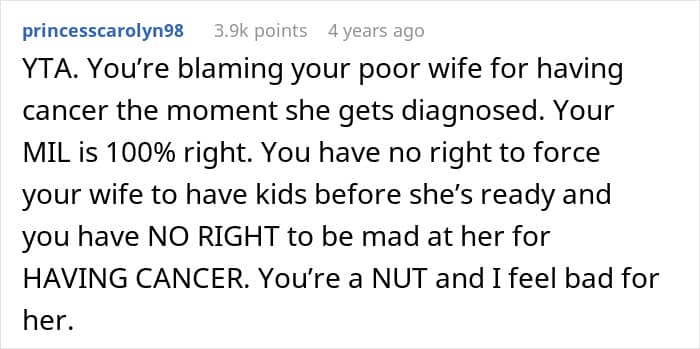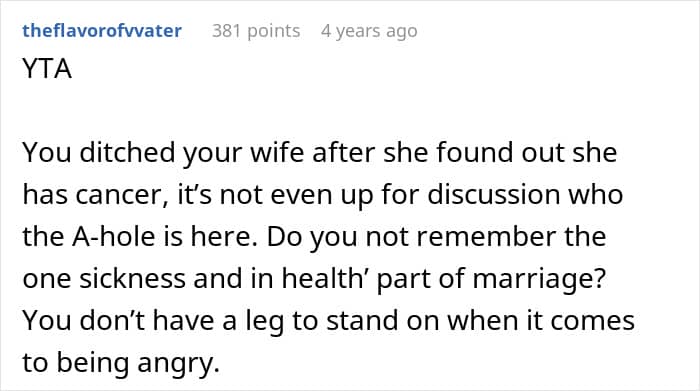Life has a funny way of throwing curveballs. One minute you’re sipping mediocre hotel coffee on a business trip, and the next, you’re driving back home because your wife checked herself into the ER with unexplained pelvic pain.
For today’s Original Poster (OP), what started as a terrifying hospital visit ended with him leaving his wife at the hospital to come to terms with reality after learning she had ovarian cancer.
More info: Reddit
RELATED:There are moments in life when everything falls apart, and in those moments, the actions of the people we love most can make all the difference

The author was on a business trip when he was called to the hospital, where his wife was diagnosed with ovarian cancer


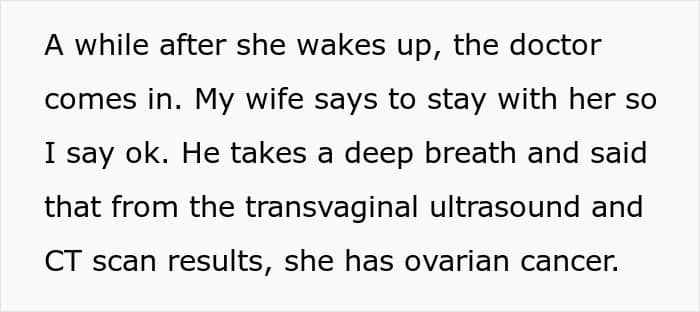


Image credit: fassaaai

The diagnosis included the need for a full hysterectomy, which ended their chances of having biological children
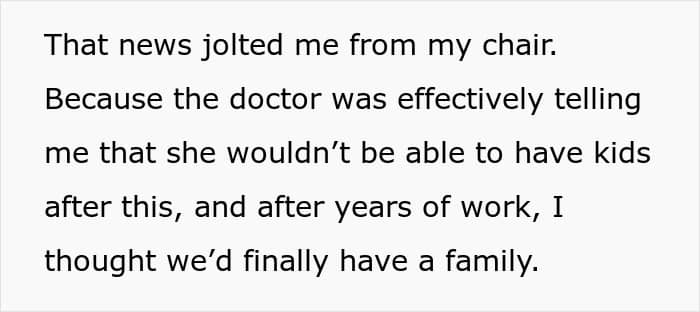
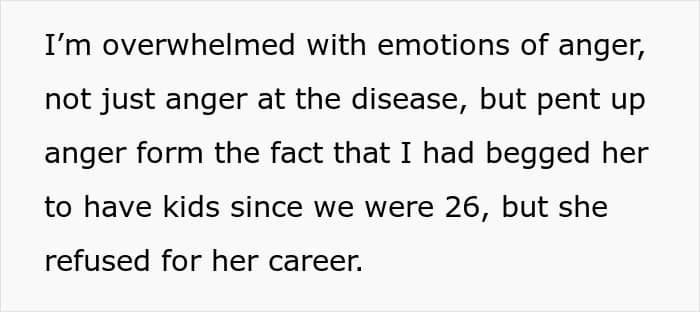
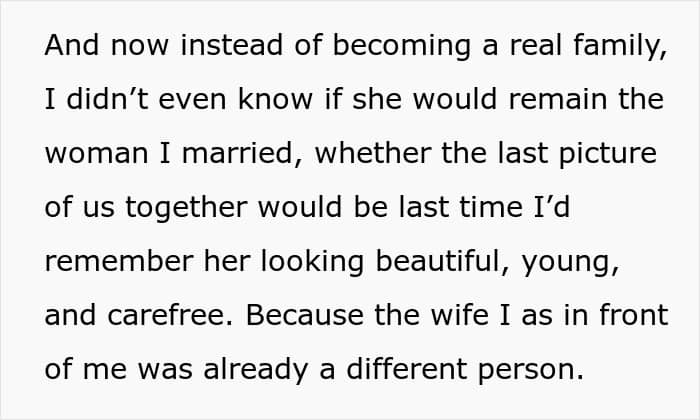


Image credit: fassaaai

Overwhelmed, he left the hospital and spent the night in a hotel, grappling with grief and anger at the fact that he had wanted kids much earlier
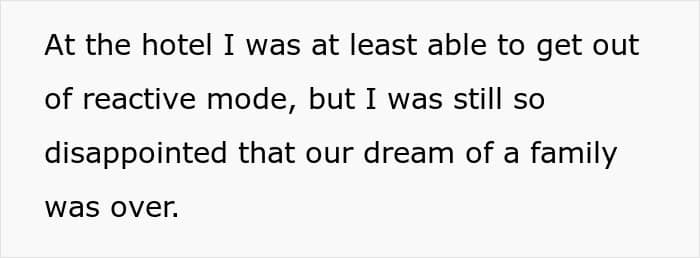



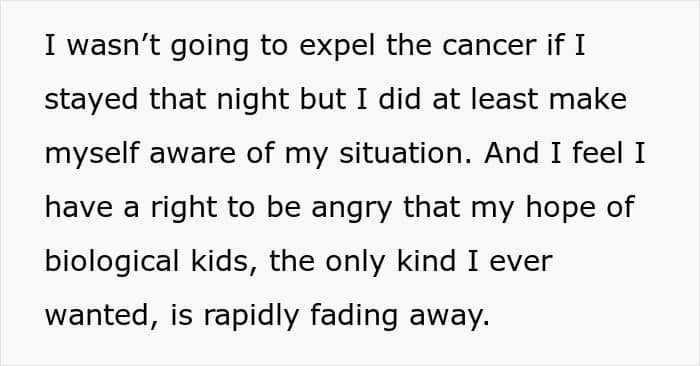
Image credit: fassaaai
He eventually received a call from his mother-in-law telling him it would be best if he didn’t return to the hospital
On a routine Friday, the OP received a call that his wife was in the ER with excruciating pelvic pain. He rushed back from his business trip to be by her side; however, the next morning, they received the gut-wrenching news that she had ovarian cancer.
While his wife broke down in tears, he was initially paralyzed with heartbreak, shock, and anger all at once. He was not only angry at the diagnosis, but he was also angry about the years of pleading with his wife to start a family earlier.
When his wife tried to hold his hand and suggest adoption, his emotions boiled over, and instead of staying to comfort her, he grabbed his suitcase and drove off to a hotel, not bothering to confirm if she would be staying the night at the hospital.
Meanwhile, his mother-in-law eventually called to tell him that it might be best if he didn’t return to the hospital. This left the OP wondering if he was wrong to react the way he did, or if his honest, emotional response was valid in such a shocking moment.
To gain expert insight into the medical aspects of ovarian cancer, We reached out to Sofia Robles, a gynecologist specializing in reproductive health, who explained that while ovarian cancer is rare in women in their early 30s, it can be quite serious.
She stated that the aggressiveness of the disease largely depends on its type and the stage at which it’s diagnosed. “Germ cell tumors, which are more common in younger women, generally have a better prognosis and respond well to treatment,” Robles noted. “However, epithelial ovarian cancers, which are more common in older women, are often more aggressive and harder to detect early.”

She highlighted that treatment typically involves surgery and chemotherapy, with better outcomes when caught early. In some cases, fertility-preserving options may also be considered depending on the type and extent of the cancer.
When ovarian cancer is diagnosed, a full hysterectomy, including the removal of the ovaries and fallopian tubes, is often recommended. Robles elaborated, “Ovarian cancer can spread to the pelvis and abdomen, so removing all reproductive organs ensures complete removal of the disease and reduces the risk of recurrence.”
She also noted that this procedure is especially important for advanced cancer or when the disease has spread to surrounding organs. While it’s crucial for long-term survival, Robles pointed out that this type of surgery can have significant implications for fertility and hormone levels.
For partners supporting a loved one through such a serious diagnosis, she emphasized the importance of emotional and practical support. “It’s crucial to acknowledge your own feelings and seek help if needed,” she advised. “However, being present, listening without judgment, and reassuring your partner that you’re in this together can provide immense comfort.”
Robles also recommended small acts of kindness, such as helping with daily tasks or attending medical appointments. “Maintaining open communication and expressing your own emotions in a healthy way can help both of you navigate this difficult time together.”
Netizens strongly condemned the OP, expressing shock at his self-centeredness, especially in the face of his wife’s life-altering cancer diagnosis. Many called him out for prioritizing his lost dream of biological children over her survival, and also criticized his apparent objectification of his wife.
What do you think about this situation? Do you think grief over lost dreams, like not having biological children, can ever justify leaving one’s partner at the hospital? We would love to know your thoughts!
Netizens expressed their anger at the author and accused him of being selfish and viewing his wife as an incubator


